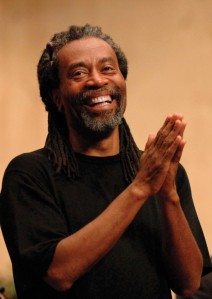 Last week Debbie and I were lucky enough to see Bobby McFerrin perform in Central Park. It was a beautiful evening, it was a free show, and we got there early enough to get good seats, spreading out a blanket as the sky darkened for his ninety minute performance.
Last week Debbie and I were lucky enough to see Bobby McFerrin perform in Central Park. It was a beautiful evening, it was a free show, and we got there early enough to get good seats, spreading out a blanket as the sky darkened for his ninety minute performance.
Watching McFerrin sing is a revelation – most striking is how relaxed he is on stage. I’ve often felt that a performer’s greatest strength comes from being relaxed and open to the moment, and McFerrin is the king of that. From the second he came on, it felt like the stage was his home and we were visiting him. He sat easily in a chair, or wandered casually among his band members, as he went through most of the songs on his new album, “Spirit You All”, a deeply religious recording that recasts a number of spirituals and numbers from the Black church, as well as original compositions and a take on Dylan’s “I Shall Be Released”.
While McFerrin is a virtuoso and a master he does not show off – while he has an incredible range and great falsetto, most of the time his voice is a relaxed, easy, normal sounding voice. Many performers spend a lot of time building up a wall between themselves and their audience through their virtuosity – the message is “Don’t try this at home – you’re not like me”. Not McFerrin – he’s not trying to blow you away – although he does every once in a while with some amazing displays, all done with humor and class. Instead, he uses his art to build a bridge. Out of this relaxation and comfort on stage comes his improvisation – you get the sense he is really playing – playing with his own voice, with the musicians around him, and with the audience.
Especially with the audience. In interviews, McFerrin talks about his interest in taking the focus off himself and putting it on the audience, so they are part of the experience and performance. If you’ve seen him live, you know how good he is at this – better than anyone else, even my guiding light, Pete Seeger. Wandering into the audience while singing “He’s Got the Whole World in His Hands” (including verses where the gender shifts to “She’s got…”) he held up the microphone to a half dozen people. EVERY ONE OF THEM SANG. REALLY WELL! They sang well because he knew they could. Their success made us all feel part of it, and also affirmed McFerrin’s message – we all have a voice.
In a great interview with Krista Tippett Bobby talks about American Idol and says, “They have good voices. They sing in tune. But so what? What are you saying?”
I think about all these things when I do a show. I think about how I can make the audience part of what I’m doing, so it’s something we’re doing together. Those of you who have seen my story “Build Me Up Buttercup” will know what I mean. Like McFerrin, I want to do something that says “We all have a voice.” Watching Bobby McFerrin makes me want to do it better.
Here’s another link to an amazing demonstration he gives of the pentatonic scale.







